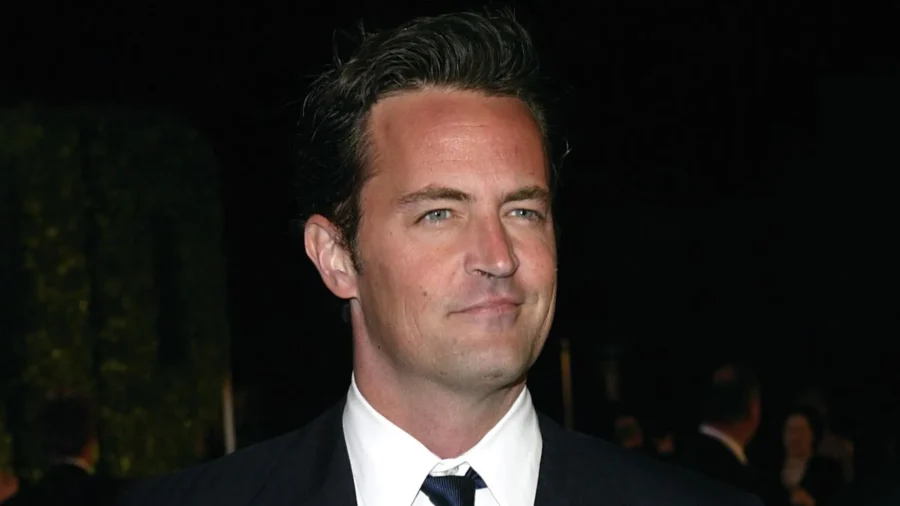Family members of late “Friends” star Mathew Perry took time to remember him on the first anniversary of his death this week.
In an interview on the “Today” show that aired Monday, Perry’s mother, Suzanne Morrison, stepfather and “Dateline” correspondent Keith Morrison, and sisters Caitlin, Emily, and Madeline Morrison opened up about their pain in the wake of his death and reflected on the government investigation into drug suppliers linked to his overdose.
Perry died on Oct. 28, 2023, at the age of 54, from the “acute effects of ketamine” as well as drowning, according to an autopsy report.
His mother described a moment she experienced with her son shortly before he died when he was showing her one of his new houses.
“He came up to me and said, ‘I love you so much and I’m so happy to be with you now.’”
“It was almost as though it was a premonition or something,” she said. “I didn’t think about it at the time but I thought: How long has it been since we’ve had a conversation like that? It’s been years.”
“I think there was something … there was an inevitability to what was gonna happen next to him, and he felt it very strongly,” she said in the interview.
“But he said, ‘I’m not frightened any more’—and it worried me.”
Perry, best known for his role as Chandler Bing in the hit 1990s sitcom “Friends,” was on his book tour just before his death. In his memoir “Friends, Lovers, and the Big Terrible Thing, Perry opened up about his journey from childhood to his struggles with addiction, details of his darkest days, and his experience with fame.
“There was one glitch, there was one problem that I couldn’t—I couldn’t conquer it, I couldn’t help him,” his mother said.
“But it must be said, I think, that he was very lonely in his soul,” she continued. Keith Morrison followed by saying, “the sort of exterior that people know about hid an insecure, often very sad guy.”
During the interview, Perry’s stepfather considered whether Perry was still sober, as the prosecutors claim, or if he had become addicted to ketamine. “It appeared to us as if he was,” he said, but Suzanne shook her head.
“Not to you?” he said to her. “It certainly seemed like it to me.”
“Though he had been treated with ketamine, it hadn’t turned into something he couldn’t control,” he continued. “Although he was a guy who would make decisions, ‘I can handle this, I can do this, I can tell you what’s right. I know the whole system inside and out. I know what the drug will do to me.’ So there was that worry: What’s he really doing?”
“I don’t even know if in his mind he had relapsed,” Madeline said.
Authorities have indicted and charged five people in relation to Perry’s death for “distributing ketamine to Perry during the final weeks of the actor’s life,” according to a press release by the Department of Justice.
Three people have pleaded guilty including Kenneth Iwamasa, Perry’s live-in assistant, Mark Chavez, a doctor from San Diego, and Erik Fleming.
Santa Monica doctor Salvador Plasencia, 42, and Jasveen Sangha, 41, also known as the “Ketamine Queen,” according to the court filings, were charged with 18-counts for their role in Perry’s death. Both are set to appear in court to face trial in early 2025.
Perry’s mother said she was “thrilled” about the charges while Keith said he hopes the legal action will have an impact.
“What I’m hoping, and I think the agencies that got involved in this are hoping, that people who have put themselves in the business of supplying people with the drugs that’ll kill them—they are now on notice,” he said. “It doesn’t matter what your professional credentials are. You’re going down, baby.”
The family shined a light on the Matthew Perry Foundation of Canada, which aims to help others struggling with addiction. The website states Perry’s family and friends are dedicated to “honour him by carrying on his commitment to helping others through recovery.”
The foundation’s mission statement says their purpose is to “mitigate the social and economic impact of addiction in Canada by funding emerging research and providing post-treatment wraparound support to people living with substance use disorders.”
“If it doesn’t stop, we’re going to lose so many [millions of] people,” Suzanne said in the interview.
“No amount of money will cure an addict, it needs something else, and that’s what we’re trying to do,” Keith said.
“He made it a big focus of his life to help other people, to encourage other people to say, ‘I need help.’ He tried to make people see that that was a brave thing,” Caitlin, who serves as the executive director of the foundation, said.

